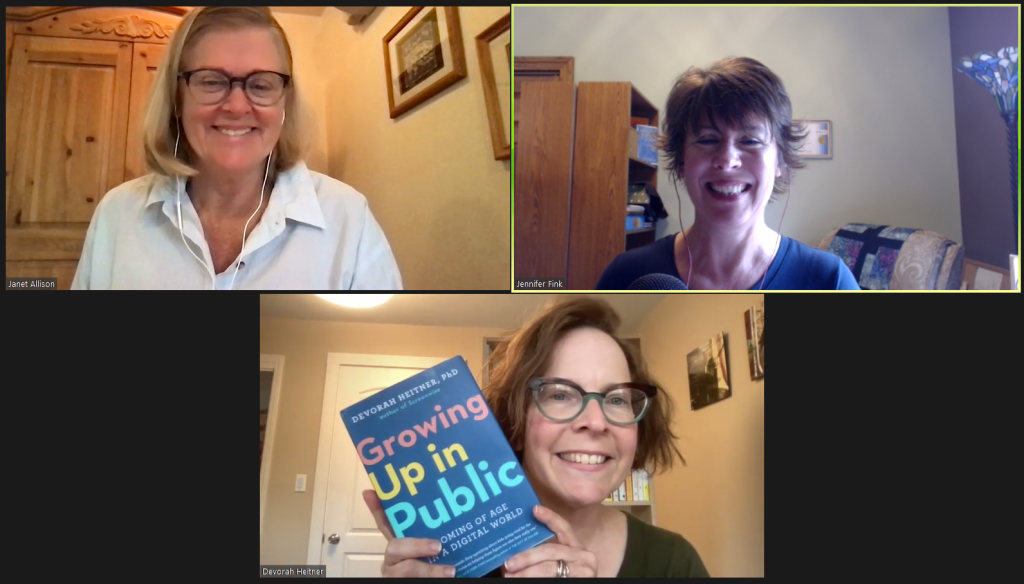color: #ea404d;
text-decoration: none;
}
.redcircle-link:hover {
color: #ea404d;
}
.redcircle-link:active {
color: #ea404d;
}
.redcircle-link:visited {
color: #ea404d;
}
Powered by RedCircle
Our boys are growing up in public.
Between social media, online monitoring, and geo-tracking, our kids’ lives are public in a way ours never were when we were young. Helping kids manage this digital landscape can be a challenge for parents and adults who often worry and frequently ignore the upsides of digital life.
“24/7 access to one another is a huge source of stress.”
Feeling that they have to be accessible at all times is stressful for our kids. But kids also enjoy positive online interactions.
“For most kids, there are aspects of their digital lives that are positive, aspects that may be more neutral, and maybe some situations that are causing them anxiety, stress, or sadness,” says Devorah Heitner, author of Growing Up in Public: Coming of Age in a Digital World and Screenwise: Helping Kids Survive (& Thrive) in Their Digital World. Our job as parents, she says, is to help kids figure out how to navigate their digital lives.
It’s best to start by looking and listening. Observe your child’s internet use. Ask questions, with genuine curiosity. That’s how we can “tune into our kids’ discernment,” Devorah says.
“We really need to know what our kids think about the group text,” for instance, she says, noting that restricting kids’ access to a group text at the first sign of “inappropriate” behavior takes away kids’ opportunity to evaluate and decide which conversations are healthy and which are toxic. “It’s often better if they make their own decisions because we’re not going to be there when they get that workplace Slack that’s a little toxic. We need them to be able to make choices.”
One thing we can do to support our kids is to remind them that they always have permission to leave uncomfortable interactions.
Mentoring vs. monitoring
Constantly monitoring our kids’ online interactions and physical whereabouts is stressful. You may be able to improve your mental well-being by letting go of the need to always know where your child is and what he’s doing.
“Your own mental health & mental load need to take priority,” Devorah says. “It’s important not to get too involved but be there for the big picture.”
It’s almost always a bad idea to digitally surveil your kids’ without their knowledge. It is much more powerful to establish boundaries and expectations together. Discuss concerns. Brainstorm ways to to satisfy your mutual concerns.
Responding to mistakes
Kids (and adults) do dumb things online. Instead of coming down harshly, take a moment to a) remember that kids’ brains are still developing and b) consider the context. Overreacting is almost never helpful.
“We have to remember that a lot of things, in the moment, can seem funny to the adolescent brain,” Devorah says. Teens also tend to overestimate the rewards & under-estimate the risks of their actions. They need us to support and empathize with them.
Helping our kids navigate the digital world “is not easy,” she admits. It helps to remember that “you’re not alone, and you can talk to other people about it.”
In this episode, Jen, Janet, & Devorah discuss:
- Coping with our fears of the internet & social media
- Why eliminating your kid’s access to the social media may not be a good idea
- Guiding kids through online interactions
- Mentoring vs. monitoring
- The “Right to Be Forgotten“
- Kids’ “rules” for social media use & digital sharing
- Kids’ vs. parents’ concerns about growing up in public
- Respecting kids’ privacy online
Links we mentioned (or should have) in this episode:
Growing Up in Public: Coming of Age in a Digital World, by Devorah Heitner
devorahheitner.com — Devorah’s website
The Fight for Your Kids’ Brains Has Already Begun — NYT newsletter referenced in this conversation
Managing Screen Time –– ON BOYS episode
Screenwise: Helping Kids Survive (& Thrive) in Their Digital World — Devorah’s first book
Screens & Boys — ON BOYS episode
Raising Kids to Thrive in a Connected World w Jordan Shapiro — ON BOYS episode
iGen – ON BOYS episode
Sponsor Spotlight: Better Help
Therapy to help you live a more empowered life. Go to BetterHelp.com/onboys to save 10%
Sponsor Spotlight: Essential Labs
Use code ONBOYS to save 15%
Sponsor Spotlight: Factor
Use code ONBOYS50 for 50% off
Sponsor Spotlight: Smart for Life
Use code ONBOYS20 for 20% off your next order




